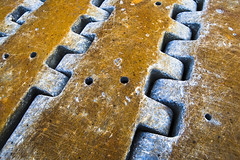
When it comes to deciding the most important event of 20
th century, historians are certainly not at a loss for possibilities. World War I, the first truly global conflict which resulted the fall of three empires (Russian, Ottoman and
Austro-Hungarian) and rise of the United States as the preeminent power, deserves serious consideration. What about the Russian Revolution of 1917? It survived invasions by Germany, Japan and the United States to become a nuclear-powered rival to Washington until 1991. Moreover, it inspired anti-American and anti-capitalist revolutions from Peking to Peru. The rise and fall of Nazi Germany, World War II, the Cold War, the moon landing in 1969 among others all merit places on any short list. The Iranian Revolution of 1979, however, may indeed be
the watershed event of the past century due to the complex vicissitudes of its global legacy.
.
On 16 January 1979, Mohammad
Reza Pahlavi (1919-1980), the Shah of Iran, fled his country in the wake of mass demonstrations against his pro-Western, modernization policies. In the past few decades before his forced exile, the Shah concentrated on attracting American and European capital to transform Persia into a nation-state with a broader social and scientific base conducive to international norms and trade. Deemed the 'White Revolution', Iranian life was changing rapidly. Women, who had been utterly subjugated under a rigid, patriarchal system, were awarded new legal rights and greater access to education. Western notions of sex, style (fashion) and secularism began to penetrate the culture. Moreover, the economy was changing from a workforce of independent craftsmen to one of laborers for foreign enterprises. While many and perhaps most Iranians embraced the changes, a strong and vociferous minority attacked the perceived loss of sovereignty. In their view, the West, particularly the United States, threatened the core Iranian identity with its imperial economic designs and non-religious (separation of church and state) worldview.
.
In 1953, a clandestine initiative undertaken by the CIA in Iran emboldened the critics of modernization.
Mohammed Mossadeq, who had become Prime Minister two years earlier through a legitimate and constitutional election, moved to nationalize the Anglo-Iranian Oil Company (currently known as British Petroleum or
BP) after diplomacy failed to resolve a lingering dispute over profit-sharing. In fact, the British company had enjoyed a preponderance of control and reaped greater financial benefits than its host. In business terms, a move toward nationalization by Tehran was understandable. It was their only leverage in negotiation.
Geopolitically, however, the decision was disastrous. Alarm bells immediately went off in London and Washington. Was Iran about to sell its vast quantity of oil to the Soviets? To preclude this possibility, the CIA devised 'Operation Ajax' to secretly overthrow
Mossadeq and install a pro-Western leader with help from the British. Unlike many CIA plots, it succeeded.
Mossadeq was imprisoned and the prospect of a 'Russian-tilt' was removed. Victory proved costly in the long-term, however, as Iranians became suspicious and embittered to American foreign policy. The Shah became discredited in the eyes of a significant segment of the population as a traitor to Iran and Islam - and regarded as a puppet of Western interests.
.
Critics and Clerics, repressed by the secret police (
SAVAK) for their dissenting views, risked imprisonment and torture. As
SAVAK turned Iran into a police state and resorted to more brutal tactics, opposition groups, particularly ultra-religious organizations advocating theocratic rule, became radicalized. By flying to New York for cancer treatment in October 1979, the exiled Shah seemed to prove the claims of his most ardent detractors. Militant propagandists convinced much of the public that its pro-West 'puppet' had escaped and was being protected by his nefarious sponsor. As a result, outraged students stormed the US embassy in Tehran two weeks later on 4 November and took 52 Americans hostage. Until their release 444 days later, the US and Iran were dangerously on the precipice of war. While Iranians chanted 'Death to America', graffiti, signs and bumper stickers reading 'Nuke Iran' appeared all over America.
.
Why should the Iranian Revolution of 1979 be considered as
the signal event of the 20
th century? Consider a few of its domestic and worldwide consequences over the last three decades:
.
1) The presidency of Jimmy Carter was effectively ended due to his inability to secure the release of hostages from a 'Third World' country.
.
2) Out of Carter's perceived weakness, conservatives, led by Ronald Reagan, were swept into power with expectations of taking a hard line on both Iran and the Soviet Union. In the ensuing years, Reagan increased the defense budget, built new nuclear missiles and began operational research on an anti-ballistic missile system ('Star Wars'). Simultaneously, Reagan backed anti-communist rebels around the world (i.e. Nicaragua, Afghanistan) to pressure the Soviet Union into negotiations and break their fragile economy. In conservative circles, Reagan is still reputed to have won the Cold War almost single-
handedly. The broader American public, largely enchanted by his commitment to freedom and optimism, awarded him a second term by a landslide in 1984. An unexpected era of conservatism in America, in which the Republican Party would control the White House for 20 of the next 28 years, had begun.
.
3) The rise of revolutionary Iran, dominated by
Shia, antagonized Sunni leader Saddam Hussein of Iraq. In order for his Sunni clique to remain in power amid a pro-Iranian
Shia majority, Saddam invaded Iran on 22 September 1980. Seeking to curb Iranian influence and establish a balance of power in the region, the United States backed Saddam with significant sales of arms. After eight long and bloody years and one million dead between the two belligerents, the war ended in a stalemate.
.
4) Iran has been instrumental in the development of modern terrorism by financing and equipping radical groups with arms. From the Hezbollah in Lebanon to
Hamas in Gaza, Iran is a key sponsor of anti-Israeli and anti-American movements.
.
5) Through a business arrangement with Moscow, Iran is currently in the process of constructing a nuclear plant at
Bushehr. Although Tehran claims the site is slated to be an alternative energy source, it is likely dedicated to the production of nuclear weapons.
.
The entrance of Ayatollah
Ruhollah Khomeini (pictured with Carter) into Tehran in 1979 changed the contours of world politics. As the Soviet Union declined and dissolved, Iran superseded Moscow as the primary existential threat to the US, and the triumph of radical Islamic militants in Persia sent shock waves around the world and emboldened a new generation of extremists and anti-modernists to roll back the influence and progress of the Western world.
.
Neither the Iranian Revolution nor its legacy have ended. As a considerable number of foreign policy decisions in Washington, London, Berlin and Moscow now revolve around Tehran, the overthrow of the Shah in 1979 may indeed be the signal event of the 21st century as well.
.
J
Roquen
 Beatrix Potter books were loved in my house as a child, so I will read them to Ashley too. Half Price Books had a copy of Peter Rabbit for ninety-eight cents. I started reading it and it was surprisingly good. I had forgotten how much I enjoyed the lush, warm art; the lyrical writing. And I was shocked at the difference in quality between this book and most of the hand-me-down crap that has infiltrated our library.
Beatrix Potter books were loved in my house as a child, so I will read them to Ashley too. Half Price Books had a copy of Peter Rabbit for ninety-eight cents. I started reading it and it was surprisingly good. I had forgotten how much I enjoyed the lush, warm art; the lyrical writing. And I was shocked at the difference in quality between this book and most of the hand-me-down crap that has infiltrated our library.











